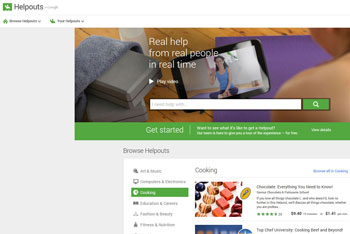Dec. 4, 2013 – What is Google? Google is a verb, a noun, a business, and a constant presence in our increasingly digital lives. When talking about this life-altering phenomenon, I always like to reminisce and say: “I remember when google was a number.”1
Google continues to retire products for declining use and introduce new products. It recently entered the social media scene with Google+ and now connects users with experts on topics from A-to-Z with Google Helpouts.
Google as Search
I won’t go into depth on Google’s search capacity and the tips and tricks to get the most out of your query – it has been done before.2 A simple update on Google Search’s ability to hold its ground should suffice: Steady at just more than two-thirds of Internet searches, Google is still by far the number one search engine used, distantly followed by Bing and Yahoo. While there are a plethora of other search engines, Google’s increasing interconnectivity via its other services makes it an easy choice to make … as long as you are OK with change.
 Google as Social Circle
Google as Social Circle
With the death of Reader and iGoogle, the company plunged into the social media world with Google+. At first an answer to the problem of having to share every update online with every acquaintance in your network, Google used Circles to appropriately divvy up one’s sharing habits. Perhaps in an effort to not see another social endeavor fail (e.g. Wave, Buzz), Google seems to be putting more emphasis on our usage of Google+ by tying login-requirements to use of its other products (e.g. YouTube, Blogger).
Google as Sage
The recent demise of the ubiquitous black bar atop the Search homepage demonstrates Google’s commitment to integration between its various products/”apps,” but it also ushered in a rather welcome surprise. The bottom of the page now sports a “Settings” tab that leads the user directly to such gems as: search settings, advanced search functions, history, and search help. While an already-completed search requires clicking into the little gear icon on the upper right of the screen to find these functions, I believe that the intuitive access to a better search demonstrates Google’s commitment to providing good information fast.

On a similar note, the brand new Google Helpouts seems to take this promise further. The concept is to create a one-stop-shop for finding specialized advice, how-to, and lessons over live video. Currently, anyone can receive or buy a Helpout, though offering one is restricted to invitation-only. At present, there are no lawyers on Helpout, though the question has been raised.
Google as Chameleon
Google retired two (sub) products in 2013, Google phased out its much beloved Google Reader in July, citing declining use. Not an avid user myself, I weathered the demise of this feed aggregator with little trouble, preferring to pare down my list of favorite sources to a human-manageable handful. In November, iGoogle was retired. Essentially a customizable homepage, Google felt that the web had evolved, making iGoogle’s purpose obsolete and clumsy.
Google as Oracle
 Megan Wiseman is the librarian and marketing coordinator for Weiss Berzowski Brady LLP in Milwaukee and Delafield.
Megan Wiseman is the librarian and marketing coordinator for Weiss Berzowski Brady LLP in Milwaukee and Delafield.
Google says the web is changing. Some might say that Google is changing the web. Whether it’s the chicken or egg, though, one thing remains true: Google is getting smarter, more applicable, and more engrained in our everyday lives. If you aren’t using it, your client is, another attorney is. More than a number, a company, a set of highly advanced tools, Google is, in many ways, our social conscience on the web. Full of all the quirks and mis-information that we feed in as well as the answers and ideas that we get out, Google is already far more than a search engine, it is a way to communicate, organize, and learn.
Endnotes
1 I am aware that googol is technically the number, and Google is something entirely different but, true or not, I like the story that goes with it. See Googol.
2 See The World of Google: Bing Chases and Google Grows, Carol Bannen, WisBar InsideTrack vol. 4, issue 9.
